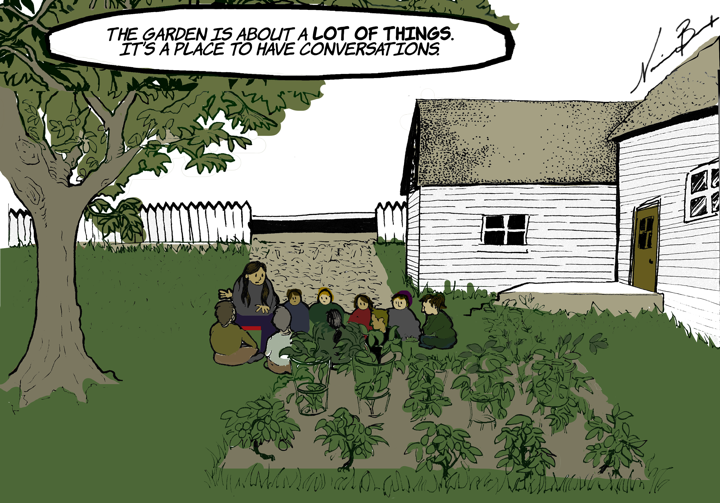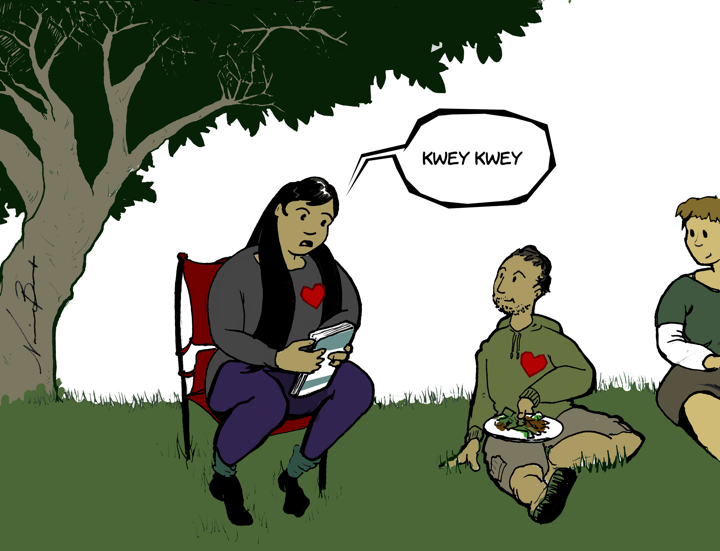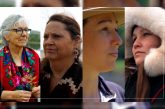
Comic credit: Ad Astra Comix
So you claim to be leftist, interested in subjugated knowledge, and you want to change the world with us. In doing this you claim to be interested in other knowledge systems such as Feminist knowledge, Indigenist knowledge, and DisAbleist knowledge and value what each has to offer, yet you don’t really get it in your practices.
If you did you would stop calling our submitted works “opinion pieces” because they do not subscribe to the methods of investigative journalism such as the myth of objectivity, the need for a third person voice, and the dominance of reason inherent in the essentialism of the five “w”s of who, what, when, where, and why. And you would stop relegating our works to lesser pay or no pay at all.
We all know that western knowledge philosophy has its limitations as does outsider investigative journalism. The debate between objectivity and subjectivity occurred a long time ago and it has been decided that both have value. Further, personal story-telling is a crucial aspect of changing oppressive structures, policies, and laws.
A Knowledge System Consists of Beliefs, a Stock, and Ways of Knowing
Feminist knowledge, Indigenist knowledge, and DisAbleist knowledge rest on the belief to be pro Feminist, pro Indigenist, and pro DIsAbleist. These systems of knowledge also have associated stocks of knowledge such as foundational thoughts, yet they are more than this.
These knowledge systems also have particular ways, or methods, of both gaining and disseminating knowledge and they are valid and legitimate in their own right. Just as our beliefs and stock knowledge do, these ways of knowing are deserving of more than being subjected to patriarchal, colonial, and able-bodied ways.
1. Knowledge is Experience
First hand experiential knowledge is knowledge on the ground and found in practice rather than just theory, speculation, or conjecture. It is the concrete knowledge of the lived experiences of oppressive laws, policies, and practices that an outsider can only sometimes observe aspects of and can never live on a day-to-day basis and thus a barrier in the knowing process.
Experiential knowledge is also called insider knowledge. Both insider and outsider knowledge have value. In many cases insider knowledge is the most important knowledge. Stop valuing outsider knowledge over insider knowledge, as outsider ways of knowing while well intended misses far too much.

2. Knowledge is Felt
While the dominant knowledge system ignores and subjugates emotional knowledge, Feminists, Indigenists, and DisAbleists value that the heart is a valid and significant repository of knowledge. When heart knowledge is denied half of the knowledge is missing. Similar to what is mindful, heart knowledge is remembered and long lasting. In fact heart knowledge is so powerful that it has the magical capacity to collapse time in one instant.
Further, some people are of the thought that if you cannot feel the knowledge that you are talking about you do not know it entirely. Racism is one such example. A person can know all the race theorists and race constructs but it is not until one lives and feels racism that one truly know what racism is. Allow us to bring in emotions as a way of knowing in our works.
3. Knowledge is Personal
Again, while the dominate knowledge system refuses to value this, Feminists, Indigenists, and DisAbleists value that the self, the body, the heart, actually one’s complete subjectivity, is the framework through which we come to know. Said another way, in the works we produce, our interpretive frameworks and lenses are the entire self.
To deny that knowledge is personal is to deny the self and to deny the people who have the real lived everyday knowledge that is needed to challenge and create new laws, new policies, and new practices; the real knowledge needed to make the world a place for all people. Let us speak and write in first person as this is the only way we can demonstrate what we know.
4. What Does Critical Theory Offer
Critical theory is a body of knowledge that asks society to think critically about the limitations of societal structures that are harming people and the world we live in.
Within this body of knowledge is the discussion about the need to value the intersectionality dimensions of layered structural oppression. What this means is a person who exists under several structural oppressions also lives the exponential aspect of it where the whole is greater than the sum of its parts. The intersectional oppressive lived experience of being an Indigenous woman with a disability is more powerful than the sum of racism, sexism, and ableism. This is the essential formula of what intersectional oppression means.
Within this body of critical theory is also the discussion that equity does not mean we treat things the same. Rather, equity means that we need to value differences and treat differences with equity as a way to gain equality. This includes different ways of knowing. To do otherwise lacks equity and leaves out important knowledge.
When considering intersectionality and equity it should become clear that all people deserve the right to earn a living off of their knowledge system. This must include their entire knowledge system: beliefs, stock, and ways of knowing.
In Summary
Feminist, Indigenist, and DisAbleist ways of knowing are inherent in what we know. It is not just the content of our stories that are important. In your process of seeking to subvert oppressive structures there is the need to value our ways of knowing as well. Our knowledge systems are complete and sophisticated, and they are deserving of respect that is on par with the western methods of objectivity and rationality and what investigative journalism is rooted in.
Feminist, Indigenist, and DisAbleist knowledge are knowledge systems that rely on valid ways of knowing and we are deserving of payment for our knowledge rather than continuously being relegated to opinion and as such less worthy of payment.
Lynn’s latest book is available at: http://www.lynngehl.com/2-truth-that-wampum-tells.html









